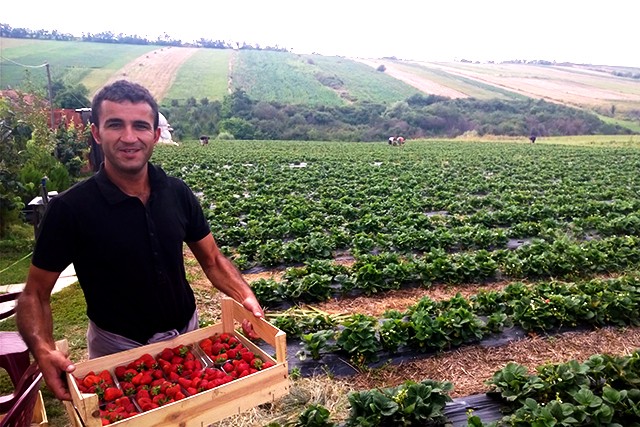
Nov. 2014—Two young agricultural entrepreneurs in Kosovo, both fresh out of college, are enjoying the fruits of their labor: record-breaking yields of strawberries. But the story of their success involves more than formal education.
When Nehat Haliti and Milazim Bislimi graduated from the University of Prishtina with degrees in agriculture in 2013, neither had any practical experience in their shared area of specialization: growing fruit. In spring 2014, USAID, through its New Opportunities for Agriculture project, stepped in to provide the two with practical training as well as planting materials to get started in farming.
The two young men were harvesting 100 to 200 kilograms of fresh strawberries a day this summer, not even half a year after each planted 25,000 strawberry runners provided by USAID. The bumper crops turned out on their respective farms in the greater Pristina region now bring in upwards of 450 euros in daily profits for each farmer.
“I can’t wait for morning to come, to jump into the field and start harvesting my strawberries,” said Haliti.
“The fact that I now own my own strawberry business is like a dream come true,” said Bislimi.
The young farmers have harvested 35 to 45 tons of strawberries per hectare, breaking the domestic record of 15 tons, according to Kosovo Ministry of Agriculture statistics.
The Albion variety of strawberries that the pair grows is prized for its sweetness, with local fresh markets offering a consistently high price of 2 to 3 euros per kilogram for the fresh-picked berries.
Looking forward, both farmers are adding employees—Haliti, for example, already has seven people working with him—and are drawing up plans to expand at their own cost.
“These young graduates had the technical skills but no capacity to be agriculture entrepreneurs. They had no idea that they even could be agriculture entrepreneurs. They all had family-owned land, totally unutilized, and they didn’t know how or where to start with no financial resources,” said Mark Wood, USAID’s New Opportunities for Agriculture program director. “These graduates would have looked into the normal job market. We have changed the paths these two young graduates would have followed, from being job takers to job makers.”
USAID’s four-year New Opportunities for Agriculture project has been working with Kosovo’s farming industry since January 2011 to create new market linkages, increase and diversify agricultural products, improve food quality and safety, and increase affordable and accessible credit.
LINKS
Follow @USAIDKosovo. on Facebook, on YouTube







Comment
Make a general inquiry or suggest an improvement.